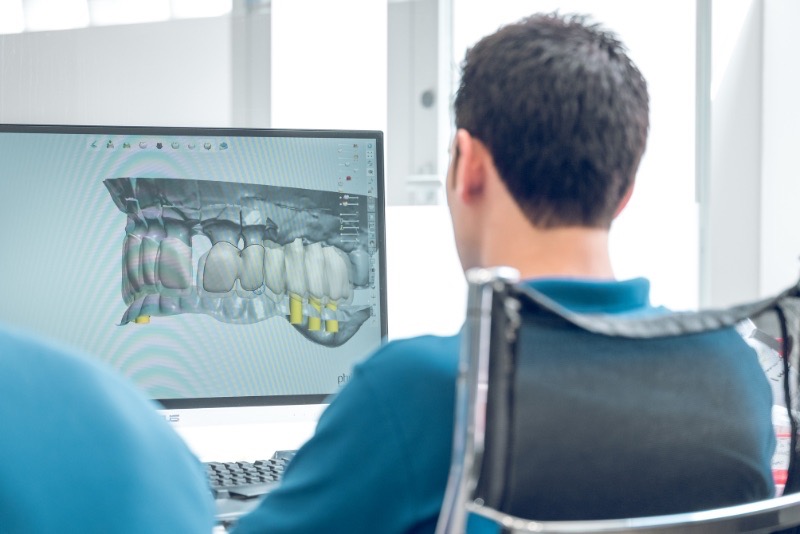Good oral health is essential to prevent dental problems and improve quality of life. This is why regular check-ups and dental treatments are so important.
At Clínica Dental Durán & Burgos, we understand that some individuals suffer from dental phobia. This irrational fear can negatively impact a person’s dental and oral health. We provide the best care to help our patients overcome it.
What Is Dental Phobia?
Dental phobia, also known as dental fear, dentophobia or odontophobia, is a condition that affects between 15% and 25% of the population, according to statistics.
People with dental phobia experience extreme dental anxiety and may feel terrified at the thought of visiting the dentist or undergoing any dental procedure. Dental-phobic people may have had negative or traumatic experiences and feel anxious.
This fear can lead to significant long-term oral health issues. Avoiding dental appointments or annual check-ups can result in untreated dental difficulties, worsening the condition and increasing the risk of complications.
Key Symptoms of Dental Phobia
While symptoms can vary in severity from mild to extreme, the main signs of dental phobia include:
- Increased heart rate
- Hyperventilation
- Headaches
- Trembling or shaking due to tension
- Excessive sweating caused by intense fear and anxiety
- Nausea or dizziness
- Feeling of choking or suffocation due to severe anxiety
- Insomnia or difficulty sleeping before a dental appointment
- Avoiding dental visits even with evident dental issues
- In severe cases, panic attacks may occur
If someone experiences symptoms of dental phobia, it is essential to seek support from a dentist or mental health professional to overcome their fear and receive necessary care safely and effectively.
Treatments for Dental Phobia
Depending on the individual case, treatment may vary and involve a combination of coping strategies, therapies, and medications. The most common approaches to alleviating and managing dental phobia include:
Relaxation Techniques
Meditation, deep breathing, and progressive muscle relaxation are some relaxation techniques that can help in these cases. These methods reduce stress and anxiety, making dental visits less daunting.
Exposure Therapy
This involves gradually exposing the individual to fear-inducing situations, starting with the least threatening. Later, the patient can progress to those that are more challenging. Over time, this approach helps patients become accustomed to the experience and reduces fear.
Cognitive Behavioural Therapy (CBT)
This therapy, conducted by specialised psychologists, aims to change negative thoughts and behaviours associated with dental phobia. It involves identifying irrational fears and developing skills to manage anxiety-provoking situations.
Conscious Sedation
In specific cases, anaesthesia and conscious sedation can relax patients during dental procedures. This can involve inhaling nitrous oxide or administering oral or intravenous sedatives.
Building a trusting relationship with the patient is fundamental in all cases of dental phobia. Recognising the problem and being willing to address it is the first step toward overcoming it.
Learn more with our Blog: What is Digital Dentistry, and its benefits?
Dental Fear in Adults and Children
Dental phobia can affect both adults and children.
- For adults, it is often the result of negative, painful, or past negative experiences. It can also stem from increased self-awareness and concern about professional judgment. Adults who have avoided dental visits for a long time may fear attending due to the possibility of needing invasive treatments.
- In children, dental phobia is primarily due to the fear of the unknown, the clinical environment, dental tools, and unfamiliar professionals.
Whether for children or adults, effective communication and creating a comfortable, safe environment are crucial for appropriate dental care. Discover more about our treatments in Paediatric Dentistry.
How Do We Manage It at Durán & Burgos?
At our dental clinic in Sitges, our highly trained professionals handle these situations with professionalism, empathy, and understanding.
We recommend starting with simple treatments, such as routine cleaning, and gradually introducing exposure therapy. This approach helps patients build confidence for more complex treatments in the future.
We also teach relaxation techniques, encourage patients to visit the clinic with a family member beforehand to familiarise themselves with the environment, and establish a clear signal (e.g., raising a hand) for patients to indicate discomfort or a desire to pause treatment—this doesn’t need to be due to physical discomfort alone.
In specific cases, we may use conscious sedation to help patients relax during dental procedures.
At Clínica Dental Durán & Burgos, we help you overcome your fear of the dentist and support you throughout the process. Our goal is to provide you with the utmost care and assistance to achieve optimal oral health. We’re with you every step of the way.







